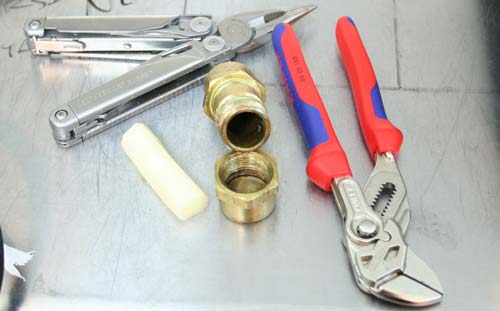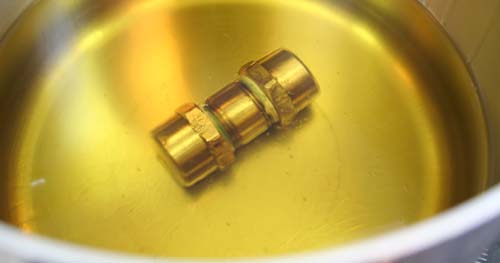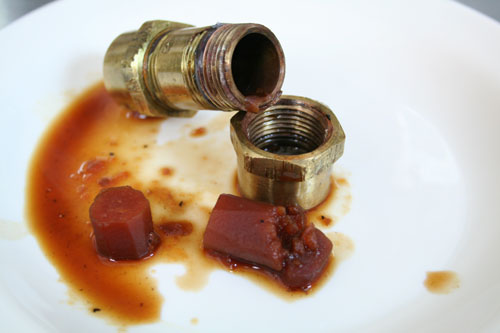Posted by Dave Arnold
Danger! Don’t do this at home!
Really, don’t do this at home.
We are working on a pressure cooking primer right now. In the process, an old demo came to mind and I thought I’d post on it.Â
I wanted to cause Maillard reactions in a wet cooking environment. Maillard reactions, which are responsible for delicious brown flavors, normally take place at temperatures much higher than water can boil. This makes it hard to make a golden-brown boiled potato.
Normal pressure cookers operate at 15 psi. That pressure raises the boiling point of water to 257° F—not normally hot enough to cause Maillard reactions. Only alkaline foods, like egg whites, will brown in a pressure cooker (or even in a normal pot if you cook it for a whole day: see Hamine Eggs in Harold McGee’s book, On Food and Cooking, or in our blog under the sous vide course post).Â
If you want to do serious browning, you need a higher temperature. A casual glance at a saturated steam table will show you that at a pressure of 150 psi, water will boil at 358° F—more than enough to brown a potato. It just so happens that the schedule 40 pipe I have is rated to 150 psi… So…



Cut a potato to fit the inside of the pipe, add some water, wrap the pipe thread with Teflon tape, screw together TIGHTLY, put in 355° oil and wait 8 minutes. Most likely, the pipe will bubble a bit (it is hard to seal).
As you can see from the photo, the potato turns a dark mahogany all the way through (cause it is 355° all the way through). Even the water turns mahogany.
This experiment taught me that not all Maillard reactions produce good flavors. The Maillard pipe potato tastes awful and smells acrid. Damn it’s bad—but it’s instructive.
BTW, it’s not the brass that makes it taste bad. I’ve tried it with stainless and aluminum as well.

Is the pressure cooker primer going to be made available?
Don’t leave us psi’ing in the wind.
We are working on it. It’s mainly going to be about moderating the pungency of sulpher based flavors like onion and horseradish, texture modification of things like spices, extraction of flavors for stocks, etc. I don’t think we’ll tackle all of pressure cooking. For that we’ll probably link to someone like Miss Vikkie.
Fun!
If you have a pressure cooker, you can buy some autoclave bottles (http://www.us.schott.com/labware/english/products/duran/detail/protect_laborflaschen.html) for small scale test and put ingredients in them. They are made to withstand high heat.
On the potatoes, I believe its more of Caramelization than Maillard Reaction since there are more carbohydrate than protein.
Since Maillard Reaction happens between amino acids and simple sugars, you might wanna try these ingredients, if you have the time.
For amino acids, maybe egg white, whole egg, milk, or anything high in protein.
For simple sugar, maybe fructose, glucose, ribose, xylose.
I have no idea on the outcome since the process is very complex, you might get some good chickeny sauce out of it or total shit from the process.
Process time, amount of water, pH and a mixture of ingredients play an important part too!
Howdy HY,
We’ve done meat. God it’s awful. The potatoes do undergo Maillard as opposed to caramelization. Potatoes are high in starch but low in sugar (unless they are improperly stored). You can see this if you try and fry a french fry that has been infused with a high-sugar flavor, like onion juice. Then the fry gets a lot of caramelization (and burning) on the outside as opposed to more of a straight Maillard browning like you get with a typical fry. When Harold McGee comes to teach at the FCI we do a demo where we cook straight amino acids with reducing sugars to generate Maillard flavors, but we haven’t made anything I’m willing to eat, much less serve.
Hmm… I always thought it was caramelization because the high heat from frying breaks down the starches into simple sugars thus browning the fries. Seems like I need to do more readup. 🙂
Maillard reaction with amino acids and reducing sugars are alot more easier to handle than proteins. Though a hell lot of time is required to get that perfect taste and aroma you want.
But in your case, I would think that its easier for you to just use the juices leftover from cooking to enhance the flavor of the meat, no?
Did you guys ever finish the pressure cooker primer? I’m ready!
Awwwwww. Calling us out! We haven’t. The stock post is part of the work.
Did you try cooking it for less time like maybe just a minute?
I’ve done it a bunch of times, but not for several years. I tried a bunch of different cook times –all bad.